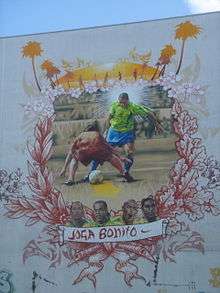Nutmeg (football)
A nutmeg (or tunnel, nut, or meg), is a playing technique used chiefly in association football, but also in field hockey, ice hockey, and basketball. The aim is to kick, roll, dribble, throw, or push the ball (or puck) between an opponent's legs (feet).
Exponents in football
Kicking the ball through an opponent's legs in order to get past them is a dribbling skill commonly used among football players, with some of the most notable proponents in the modern game including Ronaldo, Ronaldinho, Lionel Messi, Cristiano Ronaldo, Neymar and Luis Suárez.[1] Suarez became so skilled at nutmegging opponents it led to the saying: "Suarez could nutmeg a merman."[2][3]
Street football game
There is also a street football game which is titled as panna. This game depends on usage of this technique.[4][5]
Origin of the term

The origins of the word are a point of debate. An early use is in the novel A bad lot by Brian Glanville (1977).[6] According to Alex Leith's book Over the Moon, Brian - The Language of Football, "nuts refers to the testicles of the player through whose legs the ball has been passed and nutmeg is just a development from this".[7] The use of the word nutmeg to mean leg, in Cockney rhyming slang, has also been put forward as an explanation.[8]
Another theory was postulated by Peter Seddon in his book, Football Talk - The Language And Folklore Of The World's Greatest Game.[9] The word, he suggests, arose because of a sharp practice used in nutmeg exports between America and England. "Nutmegs were such a valuable commodity that unscrupulous exporters were to pull a fast one by mixing a helping of wooden replicas into the sacks being shipped to England," writes Seddon. "Being nutmegged soon came to imply stupidity on the part of the duped victim and cleverness on the part of the trickster." While such a ploy would surely not be able to be employed more than once, Seddon alleges it soon caught on in football, implying that the player whose legs the ball had been played through had been tricked, or, nutmegged.[8]
In other sports
In the National Basketball Association, Manu Ginobili and Jamaal Tinsley employ the pass between the legs variant. Some commentators also use the "5-hole" term whenever this happens. The term, "5-hole," is used in ice hockey when the puck goes between the goalie's legs into the goal.[10] Other sports such as soccer have adopted hockey's usage, at least in America.
In other languages
Nutmeg is the British English name for this technique.[8]
- In Albania it is called "Kaush" (Cornet) or "Nder Shale" (Between Thighs).
- In Angola it is called "Caguero".
- In Australia it is called a "nutmeg " or "Nuddie".
- In Austria it is called "Gurkerl", meaning "small cucumber".
- In Botswana it is called "kitchen" or "keafeta"
- In Brazil it is called a "caneta" (pen), "janelinha" (little window), "rolinho" (little roll) or tabaca.
- In Bulgaria it is called "мрежичка", meaning "a small net".
- In Cameroon it is referred to as "N'zolo"
- In Cantonese it is called "通坑渠" (drainage cleaning)
- In Cape Verde it is called "lavagem" meaning wash.
- In Czech Republic it is usually called "jesle" (hay rack) or "housle" (violin).
- In Denmark, Sweden and Norway it is called "tunnel".
- In Dutch it is known by the verb "poorten" (lit. 'gating') and the Surinamese word "panna".
- In Egypt and Saudi Arabia it is called "kobry" (كوبري), meaning "bridge (n)".
- In Ethiopia it is called "lochie", or "weled" in Tigrigna.
- In Finland it is called "puikot" (sticks).
- In France it is called "petit pont" (little bridge).
- In Germany it is called "Tunnel" (tunnel) or "Beinschuss" (leg shot).
- In Ghana it is called "SULIA"
- In Greece it is called "podia" (ποδιά) meaning "apron".
- In Hispanic America and Spain it is called "caño" (spout, pipe), "túnel" (tunnel), or "cocina" (kitchen).
- In Hong Kong it is called "通坑渠" meaning "through the pipe".
- In Hungarian it is called "kötény" (apron).
- In India it is called "Galli" meaning narrow lane.
- In Indonesia it is called kolong meaning "pit".
- In Iran it is called "lauyee" (لایی) meaning "gasket".
- In Israel it is called "השחלת חוט במחט" (lit. "threading a needle").
- In Italy it is called "pasta" or simply "tunnel".
- In Jamaican English it is known as "salad".
- In Japan it is called "Mata nuki" (lit. 'crotch punching').
- In Jordan it is called "Balaha" بلحة, meaning "date (n)".
- In Kenya it is commonly known as "chobo" or "chobwe" - kupigwa chobo (nutmegged)
- In Korea it is called "Alggagi (알 까기)" (hatching an egg).
- In Lithuanian it is called “sijonas“, which means skirt or “klynas“, which means space between your legs.
- In Malawi it is called Kalulu meaning "the hare" or "the rabbit"
- In Malaysia and Singapore it is known as an "olé" or "50sen".
- In Mandarin it is called "穿裆" (chuāndāng) meaning "through the crotch".
- In Mauritania it is called "Yali".
- In Morocco, Libya and Lebanon .(kuwait) it is called "bayda" (بيضة), meaning "egg".
- In Namibia it is called "Junjie" or "Kootjie"
- In Nigeria It is referred to as "Toros" or "Da Pata" or "Kolo" a Yoruba word which is used to refer to a local piggy bank.
- In Pakistan it is called "Chadda" or "panna"
- In Papua New Guinea it is called "one-kina", after the coin which has a hole in the middle. It is pronounced in English.
- In Peru it is called "huacha."
- In Polish it is called "założyć siatkę/dziurkę" (set up a net/a hole).
- In Portugal it is usually called a "túnel" (tunnel), "cueca" (underpants), "rata" or "ova" (roe).
- In Romania it is called "urechi", meaning "ears", or "craci", meaning "legs".
- In Russia it is called "otverstiye" (отверстие) or "ochko" (очко), meaning "hole"
- In Sierra Leone it is called "under waise" or "under cellar"
- In South Africa it is also known as a "iShibobo".
- In Tanzania it is called "tobo" or more accurately "kupigwa tobo" (nutmegged).
- In Thai it is called "ลอดดาก" or "ดากไหม้".
- In Tunisia it is called "adma" (عظمة), meaning "egg".
- In Turkey it is called "beşik" (cradle), "beşlik" (5-pointer), "bacak arası" ("from between the legs") or (for the defender) "yumurtlamak" (lay eggs).
- In Uganda it is: "okuzaala abalongo" which is giving birth to twins.
- In Ukraine it is called "p'yatdesyat kopiyok" - (fifty cents), which is derived from the comedic idea that if a player nutmegs you, you owe him 50 cents.
- In Uzbekistan it is called "Чотакай" (groin).
- In Vietnam it is called "xỏ háng" (lit. "pierced groin").
- In Zambia it is called a "pomo or Olilo"
- In Zimbabwe it is called "deya"
- In Myanmar it is called "paung kya"
- In many other European/Latin and African countries it is called "panna", a Surinamese word.
See also
Further reading
- "The Nutmeg dribbling trick". Expert Football. Retrieved 2005-12-20. — stills of a player executing a nutmeg, demonstrating the trick of pulling the ball back in order to force the defender to open his legs.
- "Finishing and Scoring". Expert Football. Retrieved 2005-12-20. — A well-positioned goalkeeper may be vulnerable to a nutmeg.
References
- ↑ "WATCH: Luis Suarez nutmeg David Luiz twice in Barcelona's win at PSG". Sky Sports. 16 April 2015.
- ↑ "Lionel Messi was king of the nutmeg as Barcelona outclassed Manchester City... and he joins Cristiano Ronaldo, Ronaldinho and Luis Suarez in our top 10". Daily Mail. 19 March 2015.
- ↑ Collins, Neil (5 July 2014). Make Us Dream: A Fan's View of the 2013/14 Season. Lulu. p. 108.
- ↑ http://jyllands-posten.dk/aarhus/sport/article6405076.ece
- ↑ https://cado.dk/reference/moelleparken/
- ↑ Page 57 "He nutmegged him ! ' 'He did,' said Peter Bailey, wonderingly, 'he did. A proper nutmeg.' What Jack had done, in fact, was to slip the ball between the legs.."
- ↑ Alex Leith Over the Moon, Brian - The Language of Football
- 1 2 3 Ingle, Sean (2005-09-07). "Where does the term nutmeg come from - the final word". The Knowledge. London: The Guardian. Retrieved 2006-08-01.
- ↑ Seddon, Peter. "Football Talk - The Language And Folklore Of The World's Greatest Game"
- ↑ "Why Do They Call It the Five Hole?". 15 October 2010. Retrieved 24 May 2015.
